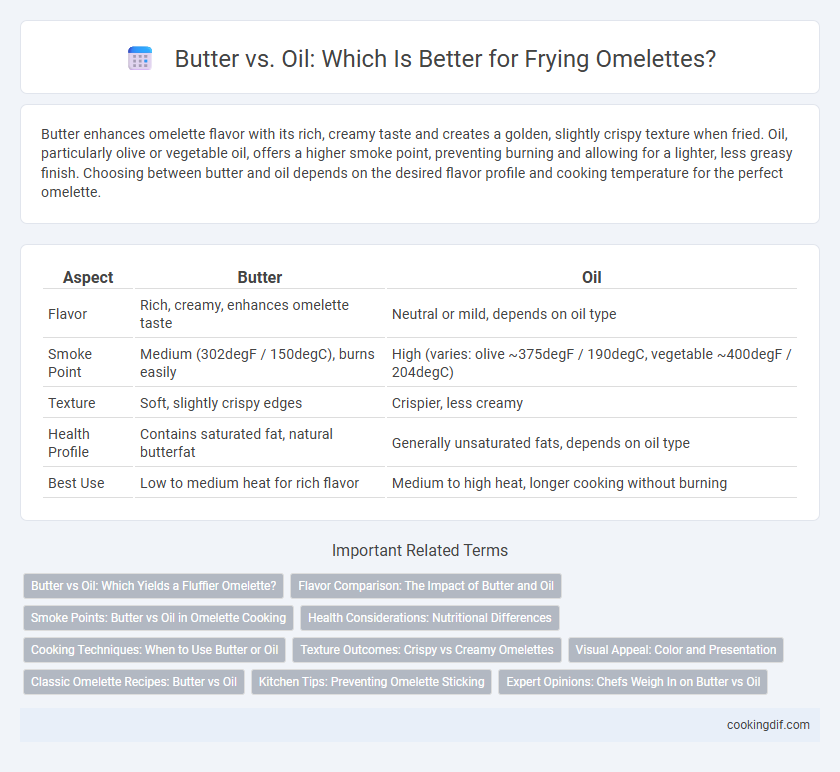Butter enhances omelette flavor with its rich, creamy taste and creates a golden, slightly crispy texture when fried. Oil, particularly olive or vegetable oil, offers a higher smoke point, preventing burning and allowing for a lighter, less greasy finish. Choosing between butter and oil depends on the desired flavor profile and cooking temperature for the perfect omelette.
Table of Comparison
| Aspect | Butter | Oil |
|---|---|---|
| Flavor | Rich, creamy, enhances omelette taste | Neutral or mild, depends on oil type |
| Smoke Point | Medium (302degF / 150degC), burns easily | High (varies: olive ~375degF / 190degC, vegetable ~400degF / 204degC) |
| Texture | Soft, slightly crispy edges | Crispier, less creamy |
| Health Profile | Contains saturated fat, natural butterfat | Generally unsaturated fats, depends on oil type |
| Best Use | Low to medium heat for rich flavor | Medium to high heat, longer cooking without burning |
Butter vs Oil: Which Yields a Fluffier Omelette?
Butter enhances the flavor and creates a richer, fluffier texture in omelettes due to its milk solids and water content, which help steam the eggs gently. Oil, particularly neutral oils like canola or vegetable oil, prevents sticking and cooks eggs evenly but tends to produce a denser omelette with a less creamy mouthfeel. For a light, tender, and airy omelette, butter is generally preferred over oil in frying.
Flavor Comparison: The Impact of Butter and Oil
Butter imparts a rich, creamy flavor and a slightly nutty aroma to omelettes, enhancing their savory profile with its natural milk solids that caramelize during cooking. Oil, particularly neutral oils like canola or vegetable oil, provides a more subtle taste, allowing the omelette's ingredients to shine without added richness. Choosing butter over oil significantly influences the flavor depth and mouthfeel of the final dish, making it more indulgent and aromatic.
Smoke Points: Butter vs Oil in Omelette Cooking
Butter, with a smoke point around 350degF (175degC), adds rich flavor to omelettes but can brown quickly and burn if overheated. Oils such as canola or vegetable oil have higher smoke points, typically between 400degF and 450degF (204degC to 232degC), allowing for more heat tolerance and less risk of burning during cooking. Choosing oil over butter for frying omelettes helps maintain a stable cooking temperature and prevents bitter burnt flavors.
Health Considerations: Nutritional Differences
Butter contains saturated fats and cholesterol, which may raise LDL cholesterol levels, while oil, especially olive or avocado oil, is rich in monounsaturated fats that support heart health. Oils have a higher smoke point than butter, reducing the risk of harmful compound formation during frying. Choosing oils with beneficial fatty acid profiles can enhance the nutritional value of an omelette compared to butter.
Cooking Techniques: When to Use Butter or Oil
Butter is ideal for frying omelettes at low to medium heat due to its rich flavor and ability to create a delicate, golden crust without burning quickly. Oil, especially olive or avocado oil with higher smoke points, is preferred for higher heat cooking, ensuring even cooking and preventing the omelette from sticking. Combining butter and oil can balance flavor and heat tolerance, promoting a tender texture and optimal browning.
Texture Outcomes: Crispy vs Creamy Omelettes
Butter creates a creamy, rich texture for omelettes due to its milk solids and water content that melt, providing a smooth surface. Oil, with its higher smoke point and absence of milk solids, produces a crispier edge by allowing the eggs to fry more evenly and develop a golden crust. Choosing butter or oil directly impacts whether the omelette has a tender, velvety consistency or a firm, crunchy bite.
Visual Appeal: Color and Presentation
Butter imparts a golden-yellow hue to omelettes, enhancing their visual appeal with a rich, glossy finish. Oil, especially neutral oils like canola or sunflower, tends to produce a paler, matte surface that may appear less vibrant. The slight browning from butter creates an appetizing, evenly colored omelette that elevates presentation on the plate.
Classic Omelette Recipes: Butter vs Oil
Butter provides a rich, creamy flavor and helps achieve a golden, tender texture in classic omelette recipes, while oil offers a higher smoke point that prevents burning and allows for healthier cooking options. Using clarified butter combines the benefits of both by enhancing taste without the risk of burning at moderate heat. Chefs often prefer butter for traditional French-style omelettes to maintain authentic flavor and smooth consistency.
Kitchen Tips: Preventing Omelette Sticking
Using butter for frying omelettes provides a rich flavor and helps create a non-stick surface due to its milk solids, which brown and add texture. Oil, especially oils with high smoke points like avocado or canola, prevents sticking without burning, making it ideal for higher heat cooking. To prevent omelettes from sticking, preheat the pan properly and use the right amount of fat, whether butter or oil, to create a smooth cooking surface.
Expert Opinions: Chefs Weigh In on Butter vs Oil
Expert chefs recommend using butter for omelette frying due to its rich flavor and ability to create a golden, crispy exterior. Some culinary professionals prefer oil, such as olive or avocado oil, for its higher smoke point and neutral taste, which prevents burning and allows the egg flavor to stand out. Balancing butter and oil can offer the best of both worlds by combining buttery aroma with a stable cooking temperature.
Butter vs Oil for omelette frying Infographic

 cookingdif.com
cookingdif.com